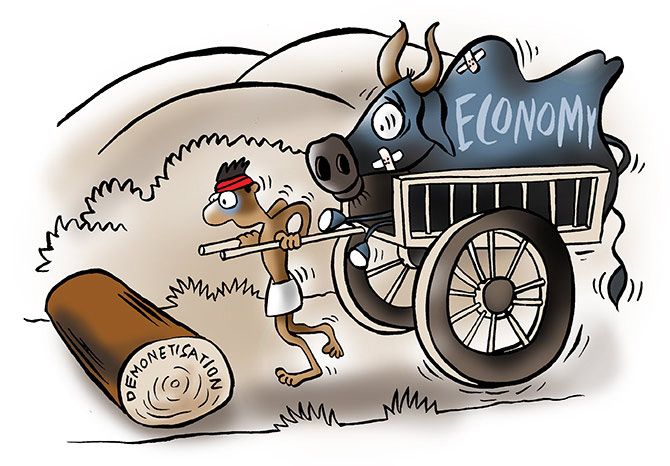
'Everyone is still trying to understand the quantum of impact demonetisation will have on the economy.'
Tinesh Bhasin reports.
Illustration: Uttam Ghosh/Rediff.com
Brace yourself for moderate returns on investments this year, as the impact of demonetisation will continue to resonate across asset classes.
On the brighter side, your real returns could still be adequate if the inflation rate declines below five per cent.
"This is not going to be a year of big returns for investors. The next quarter is expected to be subdued, as demand has slowed. Everyone is still trying to understand the quantum of impact demonetisation will have on the economy," says Jinesh Gopani, head -- equities at Axis Mutual Fund.
Apart from demonetisation, the new year also brings its own set of opportunities and challenges.
Fund managers feel certain themes can help investors earn better returns if they align their portfolios to benefit from these.
Consumption to make a comeback
Finance Minister Arun Jaitley is likely to announce sops in the Budget that will boost farmers' income.
There are also expectations of a cut in the corporate tax rate, based on the previous year's Budget speech.
Jaitley had said the government wanted to double farmers' income in the next five years and bring down corporate tax to 25% over the next four years.
Investment managers feel if these steps are taken, demand for consumer staples will stage a comeback.
"Even a small revision in the tax rate would add to companies' profits and impact their price-to-earnings ratio," says Anand Shah, chief investment officer, BNP Paribas Mutual Fund.
While valuations in the consumer sector remain rich, Gopani feels it will still make for an attractive investment opportunity.
Financial sector stays attractive
Private banks have been investors' favourites through the previous year and will continue to remain so.
As the government takes measures to bring back growth, large public sector banks will also gain prominence with investors.
Once consumption picks up, it will have a ripple effect on credit demand -- companies will need more capital for higher production to meet demand.
Fund managers expect credit demand to pick up in the second half.
Finance companies will also benefit, as the government continues to spend on infrastructure projects.
Investors can also get profit from the government's thrust on promoting affordable housing. To benefit from this, investors should look at housing finance companies.
Avoid listed developers, as most of them are dominant in only one region and are not focused on affordable housing.
GST impact on industry and services
The government has announced its intention to implement the Goods and Services Tax (GST) in 2017-18.
Once implemented, it will have teething problems.
Distributors and wholesalers might avoid stocking of goods until clarity emerges. That will cause a temporary slowing in demand.
Despite this, it's going to benefit some sectors even in the near term. These include fast-moving consumer goods, e-commerce, logistics companies and automobile manufacturers.
Accrual-based debt funds to fare better
Debt investors will need to move away from funds that invest only in government securities (G-Secs) and had double-digit returns in 2016.
The focus should be on funds that hold their papers until maturity.
"G-Secs are going to be highly volatile. Banks, which are flush with funds due to demonetisation, will have to invest in G-Secs and that will lower interest rates. As inflation falls, RBI might cut rates. But international investors are selling G-Secs after the US Fed indicated there could be three interest rate hikes this year," says Murthy Nagarajan, head-fixed income, Quantum AMC.
Agrees Rajeev Radhakrishnan, head of fixed income at SBI Mutual Fund: "Over the year, government bond yields have delinked from external market dynamics and rallied sharply, especially in the second half of the year. The year 2017 could be more challenging."
In such a scenario, investors will benefit by sticking to accrual funds that invest in short-term papers.
Investors can expect to make a return of 7% to 8%.
If you still want to play the interest-rate curve, go for dynamic funds.
Realty investments via REITs
The real estate market is already struggling due to sluggish sales. So, it will be tough for investors to make money by investing directly in properties.
"Luxury property prices are expected to see a correction. Affordable housing is almost entirely present in the fringe areas of the metros, where land prices are expected to ease in a year or so due to demonetisation," says Anuj Puri, chairman and country head, JLL India.
Investors should, therefore, opt for real estate investment trusts (REITs), which are expected to be launched soon.
"The potential for REITs is huge. Currently, 229 million sq ft of office space can be seen as REIT-compliant. If even 50% of this were to get listed, we are looking at a total REIT listing worth $18.5 billion," says Puri.
The size and return potential is yet to be ascertained. Clarity on this will emerge only after a few listings.
Investors' comfort with paper gold to grow
The Sovereign Gold Bond (SGB) scheme will change the way individuals invest in gold.
Indians have always loved physical gold, be it for own consumption or investment. Gold ETFs couldn't change this.
"In 2017, we expect demand for physical gold to decline by at least 30% as investors shift to electronic mode," says Ajay Kedia, director, Kedia Commodity.
Agrees Bhargav Vaidya, a bullion expert: "Individuals find SGBs attractive, as it comes with a government guarantee and better return potential."
Apart from SGB, this year gold auctions will start on the MCX, which will further reduce the already dwindling demand for physical gold.










